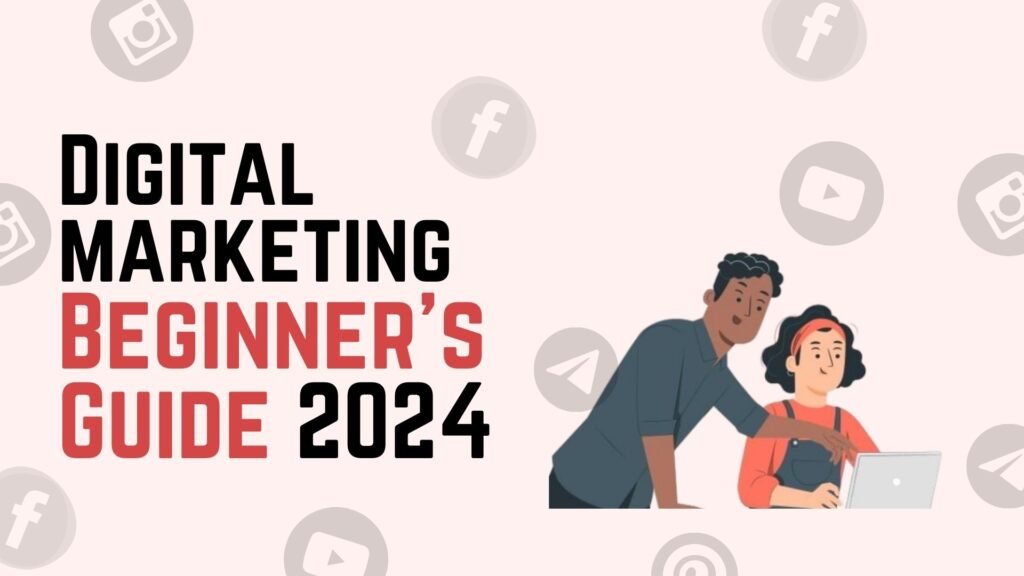Digital Marketing : A Beginner's Guide 2024

Digital Marketing for Beginners to Unlock the power to supercharge your business. By harnessing the potential of online channels, you can connect with your target audience, build brand awareness, and generate leads. Explore essential strategies like SEO, PPC advertising, social media marketing, content marketing, and email marketing to drive measurable results and achieve significant growth.
What is Digital Marketing?
Digital marketing is the practice of using digital channels and technologies to promote products, services, and brands. It encompasses a wide range of strategies and tactics to reach and engage customers in the digital space.
Key Benefits
Improved targeting, real-time data, cost-effectiveness, and measurable results make digital marketing a powerful tool for businesses of all sizes to reach their desired audience and achieve their marketing goals.
Evolving Landscape
As technology and consumer behavior continue to evolve, the digital marketing landscape is constantly changing. Staying up-to-date with the latest trends and best practices is crucial for effective digital marketing strategies.
Key Digital Marketing Channels
Paid Advertising
Leverage targeted ads on search engines, social media, and other online platforms to reach your target audience and drive conversions.
Organic Search
Improve your website’s visibility and attract more organic traffic by optimizing your website and content to rank higher in search engine results.
Social Media
Engage with your audience, build brand awareness, and drive conversions through strategic social media marketing efforts.
Search Engine Optimization (SEO)
SEO is the practice of optimizing your website to improve its visibility on search engine results pages (SERPs).By optimizing your website’s content and technical aspects, you can attract organic, or unpaid, traffic from search engines like Google. By mastering SEO, you can increase your website’s organic traffic, boost brand visibility, and drive more leads and conversions.
Keyword Research
Keyword research is the process of identifying and analyzing keywords that people use to search for information online. These keywords are crucial for optimizing your website’s content to improve its visibility on search engine results pages (SERPs). By understanding the keywords your target audience is searching for, you can create content that attracts organic traffic and drives conversions. Effective keyword research involves using tools to identify relevant keywords, analyzing search volume and competition, and incorporating these keywords strategically into your website’s content, titles, and meta descriptions.
On-Page Optimization
Ensure your website’s structure, content, and technical elements are optimized to improve search engine visibility and user experience. Create a clean and intuitive website structure, develop high-quality, keyword-rich content, optimize your website for mobile devices, minimize page load times, and implement HTTPS for security. By prioritizing these aspects, you can enhance your website’s performance in search engine results and attract more organic traffic.
Off-Page Optimization
Build high-quality backlinks from reputable websites to enhance your online presence and boost your website’s authority and ranking. Engage in effective link building strategies, participate in online communities, and leverage social media platforms to increase brand visibility. By focusing on off-site SEO techniques, you can improve your website’s credibility and attract more organic traffic. Remember, a strong backlink profile is a key factor in search engine rankings, so invest time and effort in building valuable relationships with other websites.
Social Media Marketing
Platforms
Strategically choose the social media platforms that align with your target audience and business goals, such as Facebook, Instagram, LinkedIn, Twitter, and TikTok.
Content Strategy
Create engaging, visually appealing content that resonates with your audience, and leverage features like stories, reels, and live videos to increase reach and engagement
Paid Ads
Utilize targeted social media ads to amplify your organic efforts, reach new audiences, and drive specific actions, such as website visits, lead generation, or sales.
Analytics
Monitor your social media performance, analyze data, and continuously optimize your strategies to achieve your marketing objectives.
Email Marketing
Email marketing is a digital marketing strategy that involves sending targeted email messages to a specific audience. It’s like sending personalized letters to a group of people, but digitally. Businesses use email marketing to promote products or services, share news, and build customer relationships.
Effective email marketing requires creating compelling content, segmenting your audience, and tracking key metrics like open rates and click-through rates. By consistently delivering valuable content and personalized offers, you can nurture leads, drive sales, and foster customer loyalty.
List Building
Grow your email subscriber base through lead magnets, opt-in forms, and other list-building tactics.
Segmentation
Segment your email list based on various criteria to personalize your communications and improve engagement.
Automation
Leverage email automation to streamline your marketing efforts and deliver timely, relevant messages to your audience.
Measurement
Track and analyze your email marketing performance to optimize your strategies and achieve your goals.
Content Marketing
Content Creation
Develop high-quality, valuable content in various formats, such as blog posts, videos, infographics, and podcasts.
Content Promotion
Distribute your content across multiple channels, including social media, email, and other online platforms, to reach your target audience.
Content Optimization
Continuously analyze your content performance and make data-driven decisions to improve its effectiveness and reach.
Analytics and Measurement
Analytics and measurement are essential tools in digital marketing to track and analyze the performance of your online campaigns. By using analytics tools, you can gather valuable insights into how your website or online ads are performing. You can track metrics like website traffic, user behavior, conversion rates, and return on investment (ROI). This data helps you understand what’s working and what’s not, so you can make informed decisions to optimize your strategies and achieve better results.
Tracking and Analyzing Key Metrics
Measure the success of your digital marketing efforts by tracking metrics such as website traffic, conversion rates, click-through rates, and return on investment (ROI). Leverage this data to make informed decisions and optimize your strategies for improved results.
Leveraging Reporting and Dashboards
Utilize reporting tools and customizable dashboards to gain a comprehensive view of your digital marketing performance. These insights will help you identify areas for improvement, make data-driven decisions, and demonstrate the impact of your efforts to stakeholders.
Continuous Optimization
Embrace a data-driven, iterative approach to your digital marketing. Regularly review your analytics, test new strategies, and make ongoing optimizations to ensure your efforts are aligned with your business goals and delivering the desired results.
Getting Started with Digital Marketing
Define Your Goals
Clearly articulate your business objectives and the role digital marketing can play in achieving them. This will help you create a focused, effective strategy.
Understand Your Audience
Research your target audience, their pain points, and their online behaviors to ensure your digital marketing efforts resonate with them.
Develop a Plan
Create a comprehensive digital marketing plan that outlines your strategies, tactics, and key performance indicators (KPIs) for each channel.
